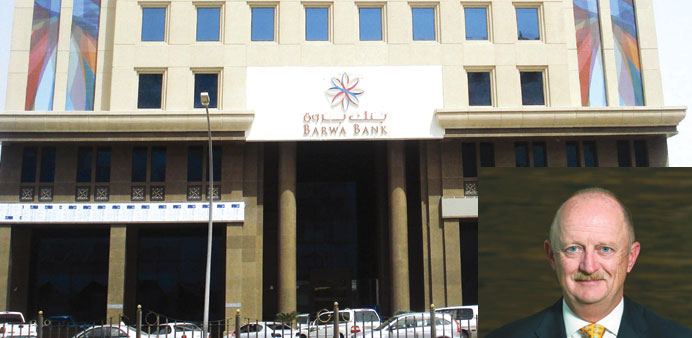Barwa Bank arranged $863mn of notes in 2012, data compiled by Bloomberg show. That made it the eighth-biggest underwriter out of 25 for GCC sukuk. “We felt there wasn’t really a regional Islamic bank trying to make the weather in that sukuk space,” Barwa Bank chief executive officer Steve Troop (inset) said.
Bloomberg/Doha
Barwa Bank, the Qatari lender that became one of the top 10 underwriters of Gulf Islamic bonds within three years of opening, plans to seek a credit rating in the second half before a possible sukuk sale.
Qatar’s smallest Islamic bank helped issuers including the Qatar, Dubai and Turkish governments sell sukuk last year, as sales in the region tripled, according to the lender’s data. Barwa Bank arranged $863mn of notes in 2012, just behind QInvest, a unit of Qatar Islamic Bank, the nation’s biggest Shariah-compliant lender by assets, data compiled by Bloomberg show. That made it the eighth-biggest underwriter out of 25 for Gulf Co-operation Council sukuk.
“We felt there wasn’t really a regional Islamic bank trying to make the weather in that sukuk space,” Barwa Bank chief executive officer Steve Troop said in a February 11 interview. “There was a space for an institutional Islamic bank that could focus on that.”
Barwa Bank has been mandated for two Shariah-compliant bond offerings this quarter involving issuers based outside of Qatar, according to Troop, who declined to give details. The lender, which complies with Islamic banking rules, is considering its own issuance after borrowing costs tumbled in the past year. Issuers in Qatar doubled sales to $10bn in 2012, according to data compiled by Bloomberg.
The region’s issuers haven’t been turned off by Barwa Bank’s small size, Troop said. In addition to sovereign clients, the bank helped Dubai-based Emaar Properties and Abu Dhabi Islamic Bank sell Islamic notes in 2012, the bank said. The lender had assets of 21.5bn riyals ($5.9bn) at the end of June, about a 15th the size of QNB, the Middle East’s biggest lender, and a quarter the regional average, data compiled by Bloomberg show.
“It’s not necessarily about being the biggest,” Troop said from his office in the Qatari capital, Doha. “It’s quite clear there is continuing appetite for sukuk among investors.”
The average yield on GCC sukuk dropped 124 basis points, or 1.24 percentage points, in the past year to 3% on February 15, according to the HSBC/Nasdaq Dubai GCC US Dollar Sukuk Index. That is 39 basis points below the average yield on non-Islamic notes in the region, the HSBC/Nasdaq Dubai data show.
Sales of Islamic notes in the six-nation GCC, which includes Saudi Arabia, tripled to $21bn in 2012, and Gulf issuance is set to surge 64% this year to as much as $35bn in 2013, HSBC Holdings’ Islamic banking unit said on February 7. HSBC was the world’s biggest sukuk underwriter last year, arranging $11bn, or almost a quarter of the total, according to data compiled by Bloomberg.
Qatar’s government and companies are tapping debt markets as the nation embarks on $138bn of investments by 2016. The world’s biggest exporter of liquefied natural gas is hosting the 2022 soccer World Cup.
Barwa Bank will wait until releasing first-half results before pursuing a credit rating, Troop said. The lender, which started operations in the third quarter of 2009, posted a 60% jump in second-quarter profit last year, the most-recent filing on its website shows.
Securing a rating “is the first thing that we need to get right,” Troop said. “Then we’ll look at availability, state of the market, pricing and whether it makes sense for us, but certainly we are interested in doing so.”
Barwa Bank’s shareholders include the Qatar Investment Authority and Qatar Holding, as well as Barwa Real Estate Co. The government holds the third-highest investment grade rating at Moody’s Investors Service and Standard & Poor’s, while QNB is ranked at the companies’ fourth-highest and fifth-highest grades.
Investor interest is shifting to equities. Emerging-market shares will offer better returns than bonds this year, Royal Bank of Scotland Group’s wealth management unit, Coutts & Co, said this month.
Barwa Bank is preparing to sell shares in an initial public offering and is being advised by QInvest, Troop said. Some companies have hesitated to pursue share sales after volume on GCC stock exchanges plunged following the 2008 global credit crisis. Qatar’s benchmark QE Index, which fell 4.8% last year, is up 5.2% so far in 2013. “It’s about picking the most-auspicious time to proceed,” he said.
Regional issuers are still likely to turn to the bond market. Barwa Bank is pursuing a “strong pipeline” of mandates, according to Troop. “There’s considerable Islamic or liquidity with a bias toward Islamic structures,” he said. “Shariah-compliant fund managers just can’t get enough of this stuff.”

